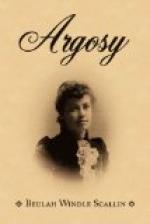“It’s well you earned her indeed, miss,” she said; “and she did be thinking of you always. The poor child, she was ill for near ten months, but I wouldn’t begrudge minding her if it was for seven year. Sure I got her the best I could, the drop of new milk and a bit o’ white bread and a grain o’ tea in a while, and meself and the old man eatin’ nothin’ but stirabout, and on Christmas night we had but a herrin’ for our dinner, not like some of the neighbours that do be scattering. Sure we never thought she was goin’ till this morning, when she bid us send for the priest. And when she saw the old man crying, ‘Father,’ says she, ’don’t fret. I’ll soon be in Heaven praying for you with me own Laurence.’ Sure she always said she’d die on the same day as him, and she didn’t after—it was of a Saturday he died and this is a Sunday.”
Louise and the Doctor looked up suddenly at each other. This was indeed the 13th of September, the day on which Laurence Capel had last year passed away.
They presently left the house of mourning, soon to become, by sad incongruity, a house of feasting, Louise leaving a little money for “the wake” in the old woman’s hands. They walked towards home together, the Doctor leading his horse.
“I hope there is nothing wrong, Miss Eden,” he asked after a little, noticing how abstracted and depressed she seemed.
“Yes,” she answered; “I have had news that troubles me. My brother has written to tell me that he is going to marry the lady at whose house he has been staying in Yorkshire; and that, as she has a large property there, he will give up his Irish appointment. They offer me a home, and I am sure they would be very kind. But what troubles me is the thought of leaving Cloon, where I have learned to help the people and to love them. I can never settle into a dull, selfish, luxurious life again.” Her eyes filled with tears as she spoke.
The young man’s heart beat fast. Might he—might he dare to lay himself at her feet? He nervously played with the horse’s mane and said tremulously, “We can never do without you now, Miss Eden. We should all be lost without you.”
He paused and looked at her. She was gazing sadly at the distant blue outline of the Clare hills, and the sun sinking behind them flashed upon her tearful eyes. She was on the other side of the horse and a little in advance, and he could not, had he dared, have touched her hand. The words came out suddenly:
“We can never do without you here: I can never do without you. Will you stay with me? I haven’t much to offer you: two hundred pounds a-year is all I am earning now, and I may soon get the hospital. I can’t give you what you are used to; but if I had the whole world and its riches, it’s to you I would bring them.”




